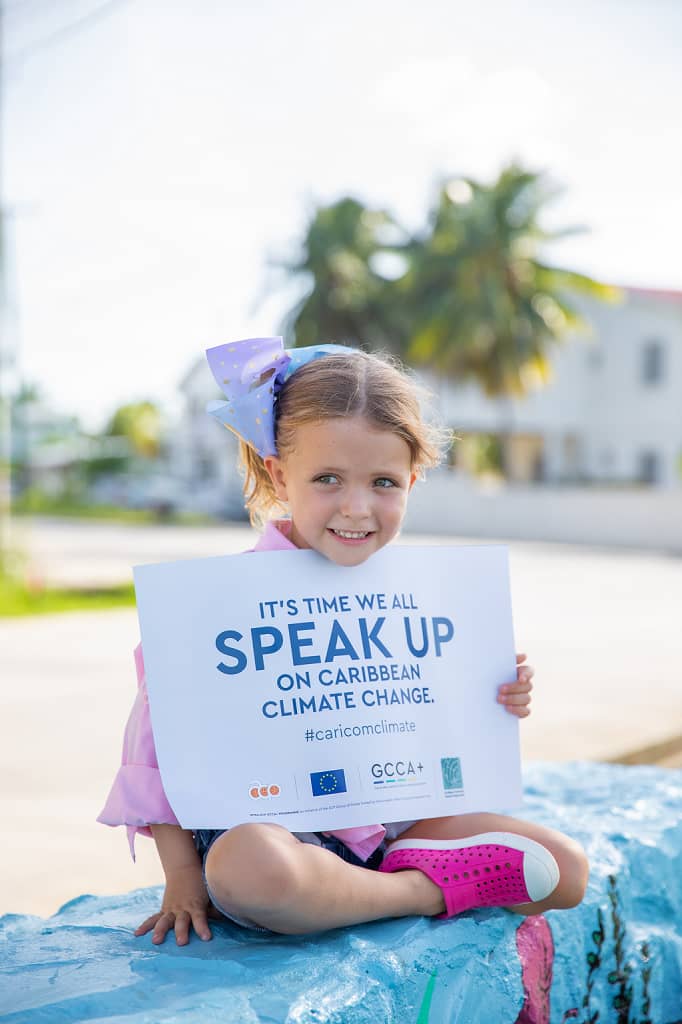
After months of preparation to capture climate change-related data to study the Knowledge, Attitude and Practices (KAP) of local populations in 5 Member States of CARIFORUM, the Caribbean Community Climate Change Centre (CCCCC) opened a 2-day workshop to deliver the results and lay the foundation for the rollout of awareness campaigns in CARIFORUM.
Expressing gratitude to the European Union (EU) and the people of Europe, for their support in making the training and the overall GCCA+ CARIFORUM Programme possible, Dr Colin Young told participants during the brief Opening that building regional capacity to communicate about climate change is an essential part of the work to be accomplished by the CCCCC.
Even though climate change is recognized by many, “as an existential threat to our way of life”, according to Dr. Young, there are “huge gaps” in communicating about climate change because “for too long, it has remained an academic or scientific issue in which messages are presented in jargons”. “We need to do much more to improve our understanding, our awareness, and our ability to adapt, respond to, and make better decisions in the face of climate change…We must rely on everyday experiences and demonstrate how our lives are being impacted by climate change”, the CCCCC Executive Director asserted.
In the last decade, Knowledge Attitude and Practice (KAP) Studies have been conducted in many Caribbean countries, yet Dr. Young noted, that, “in KAP survey after KAP survey, we find that the knowledge, attitudes, and practices of our people, as it relates to climate change and its effects are sub-optimal. He called on participants to not be “constrained by dogma”. Instead, he said, “be creative, be innovative, be bold, be passionate, be interesting and be compelling”.
Also speaking at Monday’s Opening, was Mr. Bogdan Stefanescu, Team Leader for Green Economy, Energy and Resilience in the EU Delegation to Barbados, the Eastern Caribbean States, the OECS, and CARICOM/CARIFORUM. In his remarks, Mr. Stefanescu reminded attendees about the impacts that climate change is having worldwide, for example, on, “prices of food, increased national debts, and internal displacement leading to international migration”.
Recognising the region-wide efforts to fight climate change in the Caribbean, Stefanescou noted that so far there continue to be limitations in the tools, policies, strategies, and laws developed to effectively address the climate emergency that we are facing. “Unfortunately, there are few things more difficult than changing mentalities – and truthful, direct and patient communication seems the only way of doing it, which is both relatively efficient and compatible with the nature of our democratic societies”.
Over 80 delegates representing national government agencies and regional agencies from CARIFORUM and further afield are attending the workshop which is being held virtually through a University of the West Indies platform which also registered twenty (20) of its communications students and involves a large cohort of university personnel playing various roles.
Professor Indar Ramnarine of UWI, St Augustine Campus in his address thanked the CCCCC, the EU and OIKO and AESA consultants for the collaborative work to host this important regional workshop. He said that UWI plays a leading role in climate change research and fully supports global action related to climate change.
The training session will continue through to December 8, with over 20 presenters from around the Region, expected to deliver on various topics related to climate change.
Advertise with the mоѕt vіѕіtеd nеwѕ ѕіtе іn Antigua!
We offer fully customizable and flexible digital marketing packages.
Contact us at [email protected]
















